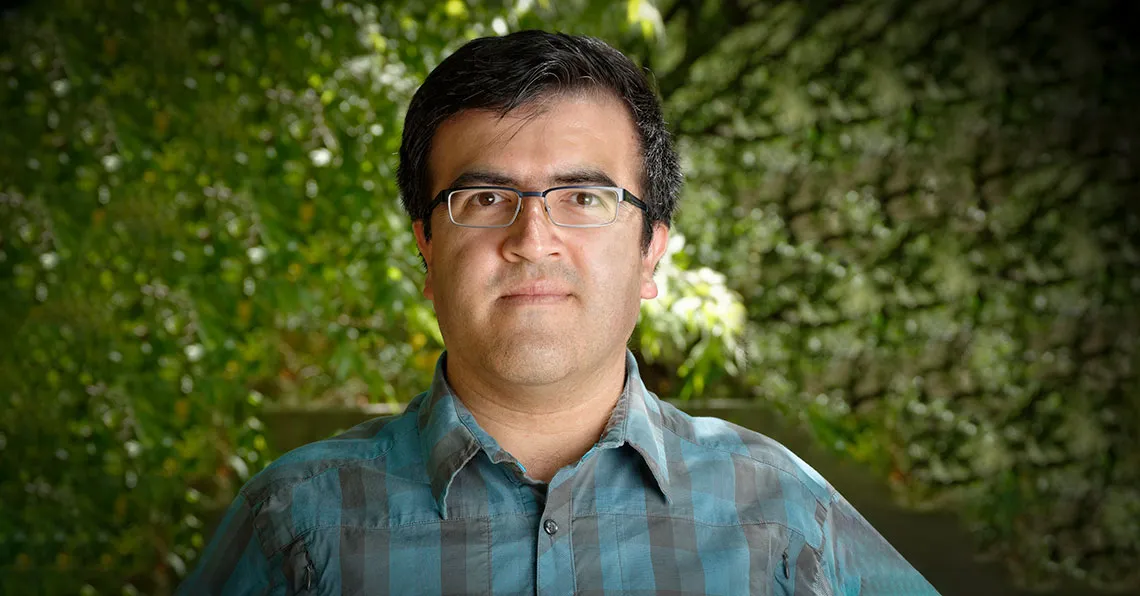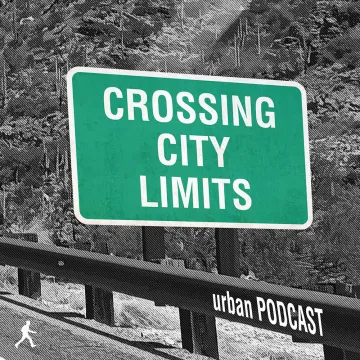Crossing City Limits (and International Time Zones): CAPLA's Eduardo Guerrero on His Popular Urban Podcast

Though the pandemic was a challenge for many, for University of Arizona Senior Lecturer in Architecture and Urban Design Eduardo Guerrero it presented a new opportunity—connecting ideas from urbanism experts around the world through conversations.
Guerrero, who received his undergraduate architecture degree in Santiago, Chile, and his graduate urban design degree from UC Berkeley, realized not only the value of such discourse itself, but also the value of making these conversations publicly available.

The result? Crossing City Limits, a podcast now 10 episodes strong that Guerrero began in January 2022 in part to connect his students at the College of Architecture, Planning and Landscape Architecture to an international network of people who “have a lot to say about the environment and culture,” he says. “By producing a podcast I have created a way to connect my students and audience with relevant design trends from colleagues and thinkers far from our culture and geographic borders.”
Each podcast is a rich conversation between Guerrero and an urbanism thought leader. For example, the Episode 01, “Urban design”, features urban designer Anna Robinson from Sydney, Australia, in a discourse about indigenous participation, inclusive design and sustainable open space. Since then, topics have included urban shade, affordable housing, post-colonial urbanism, planning Abu Dhabi, urban soundscapes, urban performance, digital platforms, urban mobility, sustainable materials and housing policy. While locations in the United States include Tucson, Phoenix, Los Angeles, Ames (Iowa), San Marcos (Texas), New York City and Washington, D.C, international locations beyond Sydney include Abu Dhabi, Barcelona, Mexico City, Berlin, Amsterdam and—coming soon—Paris, Tijuana and Civitella di Licenza.
Interview
What was your impetus for beginning the podcast series?
My impetus for creating a podcast on urban issues was because I wanted to connect ideas of experts around the world to our community. I created the podcast to connect my students to an international network of people who have a lot to say about the environment and culture. More specifically, the podcast emerged during the pandemic, when I saw myself in a bubble and started many remote conversations with colleagues around the world, thanks to the popular communications applications used during the lock down.
Some of these conversations with colleagues were remarkable, because some people are dealing with current challenges and other people are envisioning solutions for the new challenges and I was encouraged to read their publications to deeply understand their thinking. At the same time, I observed a growing interest among the same colleagues to learn about what we were doing here in Tucson. At that point, we traded our time. I lectured about contemporary urban design, affordable housing, and participatory design in India, the United States and Chile, while a few of my colleagues agreed to or identified people I should interview. The deep, professional conversations during lockdown became the framework for a podcast series that dives deeply into a range of topics heard in a cozy conversation.
Additionally, because we always present new challenges to our students, and we want them to do research about new specific topics, I saw the need to intersect the thirst for knowledge among my students with experts in different cities of the world. By producing a podcast I have created a way to connect my students and audience with relevant design trends from colleagues and thinkers far from our culture and geographic borders.
Why a podcast versus, say, a blog or video interview series?
An important part of our discipline is experiential, and many times focused on visual and spatial information. I saw a challenge in the action of abstracting that visual information, gathering the essential ideas and compressing it into auditory information. Maybe that is one of the reasons why there are very few podcasts about urbanism or architecture in public platforms.
As a way of experiencing urban environments, some episodes of Crossing City Limits include soundscapes from different cities. These soundscapes are typically recorded by the guest, but some soundscapes are recorded as collaborations from a network of people around the world.
You can hear the sound of bike tires in the streets of Amsterdam. You can listen to MARTY the robot measuring radiant heat under the shade in Phoenix. You can hear a barista preparing an espresso at a café in Sydney. And you can listen to one of Berlin’s electronic raves.
From the point of view of the podcast listener, the format is very flexible and easy to bring on a commute or a walk, or to a work night in studio. It is easy to pause an episode and revisit it later.
From the perspective of the host, it has been a rewarding experience because it has required me to really hear how people talk about the built environment. I hope that listeners hear the different vocal patterns, accents and modalities of thinking, too. And, as I have, use their imagination to fully “see” cities and culture.
As an urban design and architecture instructor, does the podcast play a role in what or how you are teaching at CAPLA?
Yes, it does. I envision the podcast as an extension of a conversation that can be part of a studio session. Some topics that arise in studio sessions have triggered a podcast episode. Some conversations with colleagues have been inspirational to produce an episode and certainly the design values that I share and teach to my students are present and curated in specific episodes.
Colleagues from CAPLA have found the podcast informative and have shared Crossing City Limits episodes with their graduate students in order to trigger a discussion about shade or colonialism. I sincerely thank my colleagues for this.
I have also shared episodes of the podcast as complementary information for my studio projects in Foundation studio, Urban Housing studio and Integration of Places studio. In other instances, students have listened to the podcast on their own. One student interested in bio-based materials (Episode 09: Sustainable materials), and a student interested in anti-racist architecture education (Episode 04: Post-colonial urbanism), both have shared how the podcast steered a path of research on their own.
Also, the experience of a recent CAPLA alum, who is pursuing a master’s in urban design in Japan, found Episode 08: Urban mobility especially relevant to her research.
The series has an international scope. Why is that important?
We live in this world together. Learning about shared viewpoints and problems around the world helps us to understand each other.
There are remarkable environmental design projects, thinkers, communities and activists in each corner of the world and I envision the podcast as one way to hear about the rest of world.
Following that international scope, Crossing City Limits was introduced during June 2022 at the latest World Urban Forum (WUF 11) organized by UN Habitat. At the Forum I had the chance to attend sessions about urban data and circular economy, how to deliver affordable housing across the continents, and smart cities and green technology.
In that context, a Forum speaker accepted an invitation to participate in the podcast. Professor Carlos Moreno, Panthéon Sorbonne University in France and advisor to Mayor of Paris, had a conversation with Crossing City Limits. In it, he shared about the 15-minute city, the urban regeneration concept embraced by UN Habitat and one of the six key recommendations included in the World Cities Report 2022 (podcast release forthcoming).
Because the podcast audience is growing globally, I have started collaborating with a small network of educational podcasts and accounts related to environmental issues at the local and global level. I have also received valuable suggestions from colleagues, students and friends who are podcast listeners, and I am constantly considering these suggestions and implementing them in future podcast episodes. The momentum of the podcast is magnified by fans in the most surprising places, and I appreciate this dynamic so much, because it is helping to create a community around important themes.
How does your social/affordable housing and neighborhood revitalization background—or your other research, practice and community service endeavors—factor into the podcast series?
One of the themes the podcast pursues is housing, and by doing this the podcast has addressed the current housing crisis.
I have invited several experts to share their work with the goal of contributing to raise awareness about the importance of addressing the housing shortage from all possible local to global perspectives. The housing crisis is not just a design challenge; there are multiple layers in the history of housing and we must urgently learn from good practices anywhere. For this reason, some of the interviews about housing address policy and economic models, not just the design of housing.
I have seen first-hand how good urban projects can enhance community quality of life by incorporating transdisciplinary approaches of environmental design professions and social and technological sciences. I envision future designers with the ability to focus in the environment, not just on the edges of the lot.
The challenges we are leaving to the next generations are extremely complex and these new challenges need an interdisciplinary approach for good city-making. My hope is that the podcast not only reaches city-makers but also citizens at large. It would be terrific if more people understood how the built environment is made, and possible ways to improve it.
Please support the podcast by subscribing and re-posting on your networks!
Crossing City Limits Urban Podcast Available Episodes
- 10 Jenny Schuetz, Housing policy / Washington DC, USA
- 09 Stefan Al, Sustainable materials / New York, USA
- 08 Meredith Glaser, Urban mobility / Amsterdam, Netherlands
- 07 David Basulto, ArchDaily / Berlin, Germany
- 06 Ana Martínez, Urban performance / San Marcos, USA
- 05 Alamira Reem Al Hashimi, Planning Abu Dhabi / Abu Dhabi, UAE
- 04 Cruz García, Post-colonial urbanism / Ames, USA
- 03 Shane Phillips, Affordable housing / Los Angeles, USA>
- 02 Ariane Middel, Urban shade / Phoenix, USA
- 01 Anna Robinson, Urban design / Sydney, Australia
Crossing City Limits. A podcast about the environment and culture, a virtual place where designers and urban idealists share their stories without limits: @CrossingCityLimits



